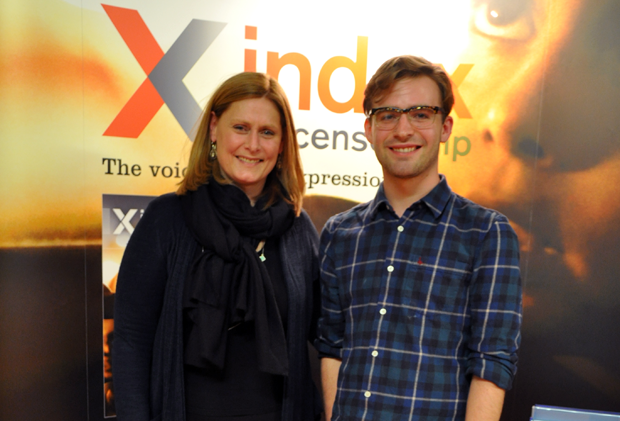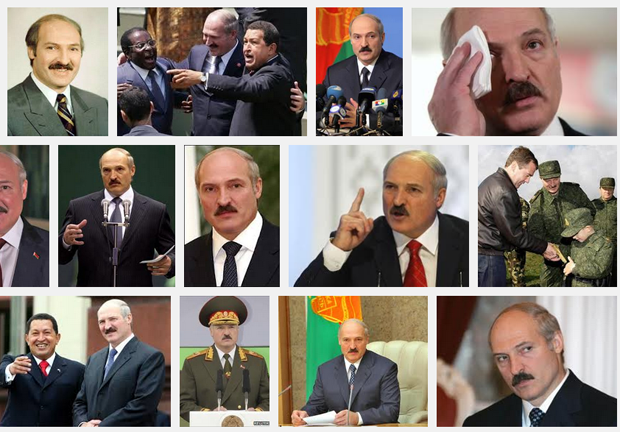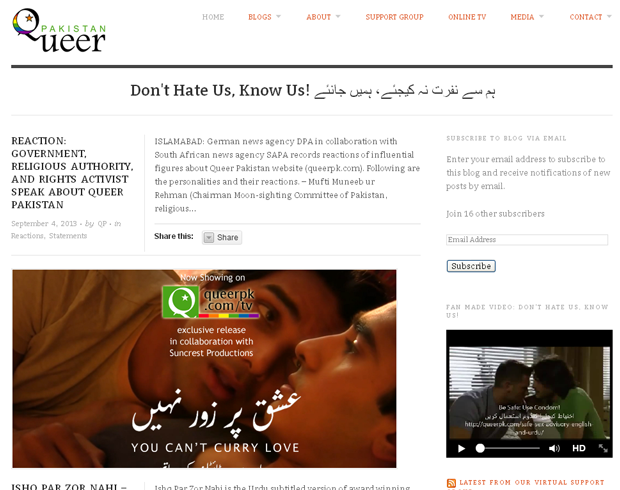16 Oct 2013 | About Index, United Kingdom

Sarah Brown and Charley-Kai John (Photo: Andrei Aliaksandrau/Index on Censorship)
Sarah Brown congratulated the winner of the first Index on Censorship student blogging competition on Tuesday after meeting at the launch of the autumn issue of the Index on Censorship magazine.
Charley-Kai John was invited to the event at Lilian Baylis Technology School in London where Brown spoke on the right for girls to have access to education.
The pair spent time discussing John’s plans for the future and his interests in freedom of expression.
The invite was part of the competition prize which also saw John’s blog, a look at internet access in North Korea, published in the magazine and online, as well as a yearly subscription to the magazine.
John is in his second year at the University of Warwick where he is studying English literature. He is also a keen cartoonist and creates images for The Boar, Warwick University’s online news publication, and The Student Journals. Entrants to the competition were asked to write about the biggest challenges to free expression in the world today.
16 Oct 2013 | Events, News, Volume 42.03 Autumn 2013
World leaders need to deliver on their pledges to institute universal primary education — especially for girls — if the world wants to empower the next generation, campaigner Sarah Brown said in a speech at the launch of the autumn issue of Index on Censorship magazine on Tuesday.
“The women who lead, read,” Brown said. “A girl with an education is the most terrifying force in the world.”
The campaigner argued passionately for education being a key, vital factor in advancement of women and girls around the world. Brown cited statistics that underlined her point: Educated girls grow into women who are more likely to educate their own children, have them vaccinated and have jobs that support a better financial life for their families.
“Why is the most terrifying thing for the Taliban a girl with a book?” she asked when talking about the role of Malala Yousafzai, the teenager who was targeted for campaigning for girls’ education. Brown is co-founder of A World At School, the campaigning education organisation that helped convene Malala Day at the United Nations this summer.
Speaking at the Lilian Baylis Technology School in London, where she also met with students, Brown followed up the speech with a question and answer session, chaired by Helen Lewis, deputy editor of New Statesman magazine.
“I don’t understand why there is so much anger at women who speak out,” Brown said when Lewis asked about Twitter trolls.
Referencing the vicious Twitter attacks on Caroline Criado-Perez, she remarked: “It’s clear that the public square does not offer a safe space for Britain’s women.”
But she also spoke on the positive sides of online speech, saying Twitter can be a “space to describe yourself as you want to be described.”
Brown conceded there is still a lot of work to be done to reach universal education. With two years left to reach the Millennium Development Goal of universal primary education, millions of children around the world still don’t have access to it.
Brown said it was appropriate for her to speak at the launch of the latest issue of Index on Censorship magazine, which includes a special report on ignored, suppressed and censored voices.
• Full text/video of Sarah Brown’s speech
This article was originally posted on 16 Oct 2013 at indexoncensorship.org
16 Oct 2013 | Belarus, European Union, News

An old Belarusian joke suggests a simple way of improving one’s life. If you feel unhappy, just allow a goat in your house, live with it for some time, and then take the goat away. In principle, nothing changes – but you feel real relief and happiness! This is exactly the way the foreign policy of Belarus operates.
Close the Swedish embassy in Minsk, and then allow its re-opening. Arrest Vladislav Baumgertner, the CEO of the Russian potash giant Uralkaliy, and then set him free. In principle nothing changed, but each story ended with something like “an improvement in the situation” – or at least with an impression of such.
Last year EU-Belarus relations, already on the rocks, were further damaged by the infamous teddy-bear parachuting and subsequent diplomatic scandal with Sweden. In comparison with that period of “cold war” 2013 looks relatively moderate. For instance, the Belarusian foreign minister Uladzimir Makey was temporarily dropped from the EU travel ban list. Nonetheless, the overall temperature of relations is frosty.
Political prisoners remain jail in Belarus. The fact two of them were released recently had nothing to do with the authorities’ good will; it happened just because their prison terms expired. The decision to suspend the travel ban for Makey was also purely technical. The position of Foreign Minister from the very beginning wasn’t on the EU travel ban list in order to leave a channel for direct communication with Belarusian authorities. Makey, personally, is still on the black list and will not be allowed to enter the EU if he leaves his minister position.
NGOs and opposition excluded from talks?
Since the beginning of 2013 the number of contacts between the EU and the Belarusian Foreign Ministry has increased. EU diplomats call this process “consultations with the Belarusian government”. But it’s hard to say exactly what the content of these consultations is. It is known that the Belarusian side propose to re-organise the European Dialogue on Modernisation. This EU initiative would establish intergovernmental relations between the European Commission and the Belarusian authorities, including an annual meeting of presidents Lukashenka and Barroso. But they have also suggested excluding representatives of civil society and political opposition from the Dialogue.
According to Belarusian authorities’ rhetoric, any relations with the EU within the framework of the Dialogue on Modernisation or the Eastern Partnership should be built “on equal basis and should focus on mutually beneficial projects.” In translation from diplomatic to real language this is nothing but a request to lift all the conditions related to democracy, rule of law and human rights, and simply invest in Belarus’ economic and infrastructure development.
It comes as no surprise that the EU is not ready to fully support these proposals right now. That they’re ready to talk about it, however, does. The next phase of the European Dialogue on Modernisation is going to be limited to experts with a focus on the themes that only the Belarusian government is interested in. In fact, civil society has not been granted the status of full participants in the Dialogue – despite numerous statements and appeals about the vital necessity of this.
Opposition fractured, weakened and ineffectual
In 2014, the European Commission and the European External Action Service (EEAS) will change their staff, so they should be interested in showing some progress with regards to Belarus. In the absence of real progress, renewal of official contacts with the Belarusian authorities could be presented as an achievement.
It is not worth blaming the EU for such behaviour, though, all the while Belarusians themselves have not done much to change the situation. Neither autocrats or democrats have undertaken significant steps to resolve the current deadlock. The latter manage to disunite – without ever forming a real unity in the first place. Political opposition was formally divided into two parts; the “People’s Referendum” campaign and the “For free and fair elections” coalition. Real differences between the two are hard to explain. Both of them pray to the old God of “communication with ordinary people”. This is a noble task in any sense, but actions proposed are not significantly different from previous unsuccessful attempts to respond to the people’s needs. The oppositions’ slogans are not easy to understand even for their closest civil society allies. Sometimes it feels like these activities are implemented just for the sake of keeping political activists busy, gaining some media attention and getting some resources from donors in the process.
The main aim for the opposition forces is to remain on the political scene until the next presidential elections. Independent civil society organisations are also divided in different camps and have lost their positive dynamics of previous years; still they have much more potential than the weakened political opposition. As a result of disunity among democrats they cannot respond properly to the EU proposals or the challenges of the internal political situation. The EU is listening to the contradictory voices of various Belarusian activists without the possibility to coordinate with them on the main course of action.
Challenges in encouraging change
Thus, the EU policy faces a clear choice: either to wait for internal changes in Belarus or try to actively facilitate them. The recommendations of the European Parliament on the EU policy towards Belarus (the so-called Paleckis’ report), adopted on 12 September 2013, make step in the latter direction. The central idea of strengthening pro-European attitudes among different groups of actors from the civil society to open-minded civil servants via closer engagement in cooperation with the EU looks good. Civil society is seen as one of the key actors in political dialogue with the EU. It is also mentioned that “the National Platform of the Civil Society Forum of the Eastern Partnership is an important and reliable partner and a unique communication channel to the Belarusian people for the EU”. Actions aiming at communicating European policies to the Belarusian citizens, expanding education programs, development of scientific cooperation are also recommended.
The European Parliament doesn’t propose significant changes in the current EU policy, but the EU needs to go much deeper into the Belarusian political situation to insure even these slight changes. The new way lies between facilitation of public dialogue between the Belarusian authorities and civil society on the one hand, and playing the engagement game with nomenklatura on the other hand.
This is not an easy task, it needs a lot of reflectivity, good understanding of the field, strong diplomacy and coordination between various actors’ – civil society organizations, political opposition forces, donor structures, EU member states, and international organizations like Council of Europe, OSCE, UN.
While playing this complicated game in some cases the EU will have to back one internal actor and its strategies against others. And this is what the EU is not ready to do. The overall approach demands to support all the actors who proclaim pro-democratic and pro-EU values. As a result the EU policy creates a plurality and centrifugal trends within the civil society and political opposition that is the main obstacle for consolidation among democrats. Attempts of strategic unification immediately run into charges of “monopolization” and “privatization” of civil society voice. The EU needs a strong internal counterpart in Belarus, which never appears without civil society consolidation, but it is not ready to let this consolidation happen. This vicious circle must be broken to proceed with the Belarus situation.
Of course, there is another way: impose travel ban on Minister Makey, then lift it – and, according to the famous “goat principle”, feel relief…
This article was originally published on 16 Oct 2013 at indexoncensorship.org
15 Oct 2013 | Digital Freedom, News, Pakistan

Pakistan’s move to ban access to a gay website reflects the conservative society’s inability to accept a “larger world view”, activists say.
“Freedom of speech remains in peril and online privacy and security is almost nonexistent in the country making dissidents worry for their and their families’ safety”, Nighat Dad, a lawyer working with the Digital Rights Foundation in Pakistan, said.
Dad was referring to last month’s blocking of a gay website www.queerpk.com by the Pakistan Telecommunication Authority for being “against Islam”.
But for others belonging to the LGBTQ community, the ban has not come as a big surprise.
“They banned YouTube, you think Queerpk would count at all?” said banker Imran, requesting only his first name to be used.
“It was quite expected and shows how immature this society is and how our government is keen on pandering to the idiocies of the worst among us”, said Ali (also preferring to use just his first name).
Kashif Khan, a gay university teacher, considers the website ban “just the tip of the iceberg” of a certain “mindset” that holds sway within the Pakistani society.
“We, as minorities, are not the only one affected by this heightened sense of self righteousness and religiosity which stems from this complete inability to entertain and appreciate any world view other than our own,” he said.
Further, he points out: “The closing of the mind and quashing of this spirit of inquiry is probably because a lot of beliefs that we have held sacred might not stand the test of rationality and empirical evidence.”
But Ali, for one, does not think it was a great idea for a group of LGBTQ community to try and create a space a space for themselves in public domain.
“Gay people here do not want a gay rights movement because this society isn’t the kind of society in which a gay rights movement can take place,” he said.
For too long, the LGBTQ community has remained invisible. They continue to enjoy both peace and relative freedom, but many fear that the moment they try to rock the boat and start demanding their rights, they may invite the attention of the religious extremist elements within society -much to their detriment.
Even the Pakistani law refuses to take a tolerant view of their existence. Article 377 of the Pakistan Penal Code prescribes up to 10 years in jail and a fine for those caught engaged in homosexual activity. Consenting sex between a man and a woman outside of marriage is criminalised and punishment awarded.
On the other hand, safeguarding citizens’ privacy is enshrined in Pakistan’s constitution, which calls “privacy rights” inviolable.
It is for that very reason Shahzad Ahmad, country director of Bytes For All, Pakistan, says that the Pakistani society “first acknowledge and recognise that the LGBTQ community exists”. It is also important, he said, to give more space to such portals where the gay community can discuss their issues in a “mature, understandable and engaging way”.
Even for Queerpk team the ban was not unexpected “given the backlash the website had received online and ‘reporting’ to PTA”. The team was prepared with a Plan B. “We mirrored the website onto a new domain, routing all traffic to the new website,” the website’s spokesperson (who didn’t want his name to be made public) wrote in an email exchange.
In addition, the website ban has not affected the netizens visiting the website in any way: “It hasn’t! If anything, it has brought together several thousand more users, hundreds of whom have written to us in appreciation and support, many of whom were not connected to any support online or offline. So for all reasons, the blockade has worked in our favour,” the spokesperson added.
When it comes to freedom of expression, Pakistan is not the most generous of countries. Freedom House’s annual report Freedom on the Net 2013 put Pakistan among the top ten countries where internet and digital media freedom is curbed.
“The recent ban of Pakistani gay websites is a clear sign that the new government is following what the past governments have been doing in Pakistan,” Dad said.
According to Ahmad the government’s “moral policing policy” curbs alternate and progressive discourse was the reason behind the blockade of Queerpk. This is not the first time that gay websites have been targeted, he explains: “I remember, another LGBTQ social networking website ManJam was banned in Pakistan and that ban still exists for Pakistani users.”
Currently there are over a dozen dating and social networking websites aimed at the Pakistani LGBTQ community. But the case of QueerpK is different, say experts, because it was more than a networking website. “Many important and relevant issues were being discussed on the website and an alternate discourse on sexual minorities’ rights was, for the first time, discussed in a very mature manner in a conservative society like Pakistan,” said Ahmad.
“With the government’s internet censorship policies over last few years it is quite evident that this new medium for communication for LGBTQ community won’t last long,” he added.
For that reason, BFA feels compelled to work with different international organisations in support of Queerpk to voice its concern against the ban. “We have also raised this issue at different forums and are also planning to raise it at the Internet Governance Forum,” Shahzad told Index.
This article was originally posted on 15 Oct 2013 at indexoncensorship.org



